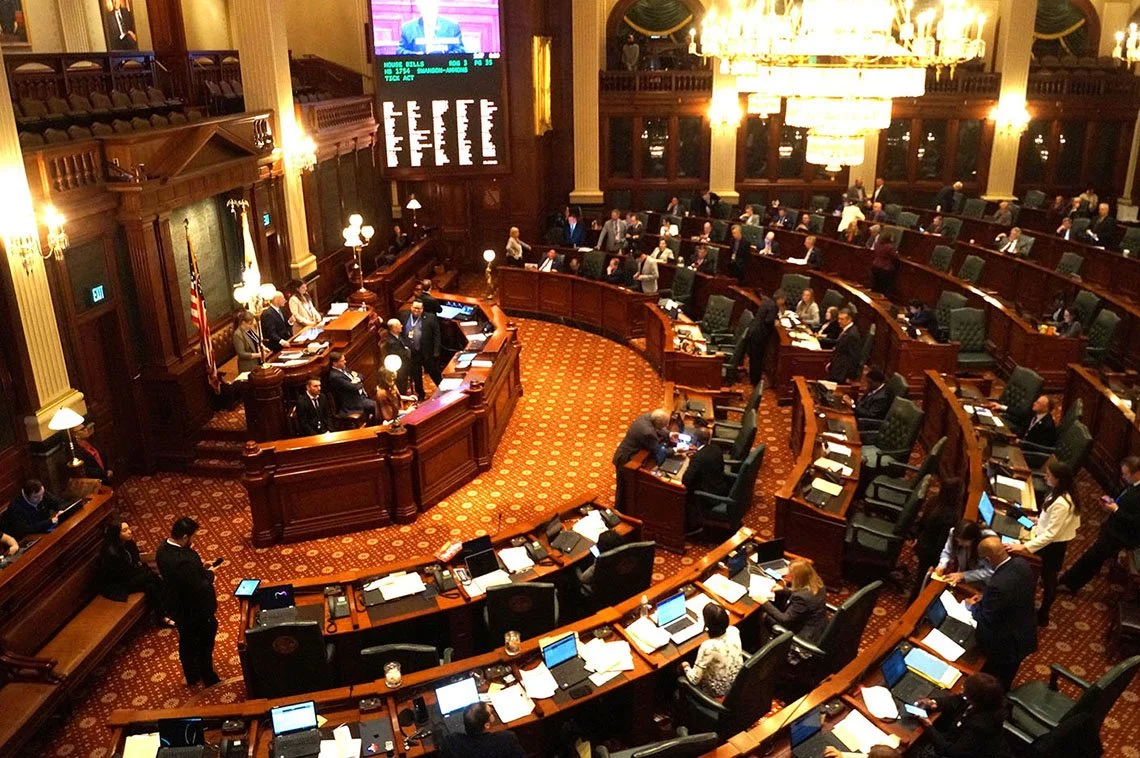There’s been yet another continuation in the court case of former Wabash County Sheriff’s Deputy Chase Cheadle. Yesterday, Cheadle was in court for a preliminary hearing but special prosecutor Brian Towne and defense attorney Jonathan Turpin agreed to a two-month delay in the case. Cheadle is now due back in court on June 12th at 9am. It’s the fifth straight month, dating back to November 14th that Cheadle’s preliminary hearing has been delayed. Cheadle, who was the sheriff’s department’s canine handler, faces four charges of official misconduct, 1 count of Theft, 1 count of Cruelty to animals, and 2 counts of Animal owner duties. Five of the eight charges are felonies. Cheadle found Kiki unresponsive last July and was arrested following an investigation. He resigned from the sheriff’s department last August 8th.
Native American mascot ban clears the Illinois House, heads to Senate
Bill requires some K-12 schools to pick new mascots, team names, logos
By BRIDGETTE FOX
Capitol News Illinois
bfox@capitolnewsillinois.com
SPRINGFIELD – Illinois K-12 schools may soon be required to pick new mascots to replace those that reference Native American names and imagery.
That would include logos, team names and mascots which 90 schools throughout the state use, such as the Mt. Zion Braves or the Cahokia Comanches, according to legislators.
House Bill 1237 passed in the House on Thursday with a vote of 71-40.
The bill points out specific mascots and names like “Redskins, Braves, Chiefs, Chieftains, Tribe, Indians, or any synonymous term” as those being banned. It also applies to logos with Native American feathered headdresses or traditionally Native American weapons, especially if combined with feathers.
If signed into law, schools would have to have a new mascot chosen by July 1, 2026. Other big changes, that would cost schools money, have a slightly longer delay.
Instead of requiring schools to buy new athletic uniforms and other school materials with new iconography as soon as the bill passes, schools could keep using those old materials until Sept. 1, 2030, as long as the new names and logo designs have been picked out.
There is also an exception for any school whose mascot has a direct tie with a federally recognized tribe and the school gets permission from that tribe to continue using the mascot. That consent would have to be renewed every five years, according to the bill.
This isn’t the first year the bill’s main sponsor, Rep. Maurice West, D-Rockford, has tried to pass the Native mascot ban.
When West tried in 2020, members of the Native American Chamber of Commerce of Illinois asked him to push for teaching Native American history in schools first.
That education bill didn’t make it into law until 2023.
Read more: Bill requiring schools to teach Native American history heads to Senate floor
“This is about the welfare and benefit of our students. It's about not harming our students,” said Andrew Johnson, executive director of NACCI, during a March 20 committee hearing. “It's also not about polls, popularity, contests, anecdotes, tradition, honor, DEI, wokeness or political correctness.”
Advocates said they wanted to focus on K-12 schools because they can choose not to be fans of professional sports teams like the Chicago Blackhawks of the NHL, but they can’t choose not to send their children to school.
This bill also does not apply to universities.
Educators and representatives said the bill would minimize children’s exposure in school to stereotypes about Native Americans.
“At one point, native mascots and logos were the most widespread education about native people in our state,” said Megan Bang, a professor at Northwestern University, during a committee hearing. “This year is our first time as a state to require teaching about native people.”
Read more: Pritzker signs bills expanding protections for Native Americans
“The contradictions of both having educators teach about real Native people, but continue to perpetuate stereotyped images, sets up for educators to have harder times with young people, and sets in motion contradictory learning objectives for young people as well,” Bang said.
When the bill was discussed on the House floor, Republicans were united against the bill in their votes after they came back from an hour-long meeting they took during the bill’s debate.
“If there's bad actors, absolutely let's get rid of them. And I will also just leave you with this question,” Travis Weaver, R-Edwards, said. “This group of people were oppressed, but is oppressed and forgotten better?”
Aaron Golding, member of the Seneca Nation Beaver Clan and member of the Chicago American Indian Community Collaborative, said in March that Native Americans’ input and concerns are often dismissed.
“Our voices and expertise on these issues are ignored,” Golding said. “See, when people are taught about our history prior to 1900 only, without an understanding of our contemporary experiences over the most recent 125 years – and ‘recent’ is pretty loosely said there – it's easy to dismiss us as ghosts of the past whose needs don't matter today.”
The bill now moves to the Senate for consideration.
Capitol News Illinois is a nonprofit, nonpartisan news service that distributes state government coverage to hundreds of news outlets statewide. It is funded primarily by the Illinois Press Foundation and the Robert R. McCormick Foundation.
Sheriff To Appoint Honorary Deputy
Wabash County Sheriff J. Derek Morgan told County Commissioners that is joining other law enforcement agencies next week in appointing DJ Daniel an honorary deputy. Here are Morgan’s comments and a copy of the order he’ll sign next week….
Late Tax Information & Dates
From Wabash County Treasurer Angela Broster:
If you have not paid the first or second installment there is a 3% penalty added to the first payment amount and a 1.5% penalty fee added to the second payment amount. Payments may be made in person at the Treasurer’s office or you may use the drop box in front of the Courthouse. Please contact the Treasurer’s office at 262-5262 regarding the correct amount with penalties.
Certified Notices will be mailed out on Thursday, April 17, 2025, then a Certified Fee of $10.00 will be added to the amount of tax due along with the penalties.
The last day to keep your name out of the paper is Friday, April 25, 2025. Names will be published in the paper on Friday, May 2, 2025. The Treasurer’s Office will not accept personal checks after May 9, 2025.
Wednesday, May 14, 2025 is the last day to pay with a Credit Card on the website listed on the back of the tax bill. Credit Card payments can be made online at www.govtechtaxpro.com.
Friday, May 23, 2025 is the Tax Sale at 10am in the Court Room.
If you have any questions or concerns about your tax bill, please feel free to contact our office.
Princeton man arrested for OWI
On April 9, 2025, at 4:19 p.m., Gibson County Central Dispatch received a report of a vehicle stuck in a field near County Road 800 West and County Road 100 North. The caller provided a detailed description of the stuck vehicle and the driver. Consequently, Communications Officer Amber Lowery dispatched county units to the area. Upon arrival, deputies found a black 2024 Chevy Malibu stuck in the field and identified the driver as 36-year-old Kyle Douglas of Princeton. While speaking with Mr. Douglas, deputies noticed signs indicating that the driver was under the influence of an unknown intoxicant. At this point, Deputy Shawn Holmes initiated a roadside DUI investigation. After the investigation concluded, Mr. Douglas was arrested and transported to the Gibson County Jail, where he was charged with operating a vehicle while intoxicated.
Assisting Deputy Holmes in this investigation were Deputies Wes Baumgart, Quinten Might, Jim Tucker, and Bart Wagner.
All criminal defendants are presumed innocent until proven guilty beyond a reasonable doubt in a court of law.
Mount Carmel man arrested for OWI
On April 9, 2025, at 11:56 p.m., Owensville Town Marshal Steven Parker conducted a traffic stop on a White 2016 Toyota SUV for speeding on State Road 65 near Evening Song Lane. Upon approaching the vehicle Officer Parker detected the odor of Marijuana. At that point, assisting officer, Deputy Michael Bates began a roadside OWI investigation on the driver, 30-year-old Cage Willis of Mount Carmel. Once the investigation was completed Deputy Bates transported Mr. Willis to the Gibson County Jail where he was charged with Operating a Vehicle While Intoxicated.
All criminal defendants are presumed innocent until proven guilty beyond a reasonable doubt in a court of law.
Plans expanding protections for trafficking, sexual assault victims approved by House
Lawmakers seek to outlaw certain chemicals used in cosmetics.
By JADE AUBREY & BEN SZALINSKI
Capitol News Illinois
news@capitolnewsillinois.com
SPRINGFIELD — A bill that would eliminate the statute of limitations for cases of involuntary servitude or trafficking passed the Illinois House on Tuesday.
Current Illinois law only allows a victim of involuntary servitude, involuntary sexual servitude of a minor, or trafficking to pursue prosecution of their offender for up to 25 years after the victim reaches the age of 18. House Bill 2602 would allow victims to pursue prosecution at any time.
Bill sponsor Rep. Anne Stava-Murray, D-Naperville, said the bill, “isn't just about putting an end to sexual assault.”
“It's about delivering justice to survivors and removing people who violate children and teens from the streets,” she said. “With this legislation, we'll be one step closer to delivering justice to childhood survivors of sex trafficking.”
Stava-Murray called the 25-year cap a protection for human traffickers who “really don’t deserve peace of mind.”
The bill passed out of the House unanimously.
House Bill 2805, sponsored by House Minority Leader Tony McCombie, R-Savanna, was also unanimously passed by the House.
This bill would prohibit insurance companies from charging deductibles, copays, or any other costs for any examinations or testing of victims of sexual assault, like rape-kits. McCombie said the bill closes a loophole as current state law prohibits insurance companies from charging for examinations and tests but does not prohibit a company from charging a co-pay.
“This makes sure that victims are not victimized on any level,” she said.
Safe cosmetic products
The House approved legislation that would prohibit businesses in Illinois from manufacturing or selling cosmetic products containing certain chemical ingredients including formaldehyde and mercury.
“We just want to make sure that our body products are safe here in the state of Illinois because some of these contain dangerous chemicals and toxic metals that cause severe health issues,” said bill sponsor Rep. Sonya Harper, D-Chicago.
House Bill 3409 passed on a 69-38 vote.
Several states and the European Union have already banned many of the dozen chemicals included in Harper’s bill.
It’s not clear how such a ban would be enforced in Illinois. According to Rep. Steve Reick, R-Woodstock, that means the bill is “toothless” and shouldn’t move forward.
Dual language education
House Bill 3026, introduced by Rep. Abdelnasser Rashid, D-Bridgeview, would enable the Illinois State Board of Education to develop guidelines schools can use to implement or expand dual language educational programs.
Last year, Rashid passed a bill that mandated the Illinois Advisory Council for Bilingual Education to issue a report outlining potential strategies the state could implement to incentivize and expand dual language education in Illinois schools. The report, published last October, spans 72 pages.
“This report identified several low hanging fruit for us to improve dual language education in our state,” Rashid said. “What HB 3026 does is it implements some of those recommendations.”
The bill does not require schools to implement the guidelines, but instead it allows them to choose their participation status. It passed the House on a vote of 77-25.
Capitol News Illinois is a nonprofit, nonpartisan news service that distributes state government coverage to hundreds of news outlets statewide. It is funded primarily by the Illinois Press Foundation and the Robert R. McCormick Foundation.
Former Bank of O’Fallon executive indicted for $2 million fraud scheme
EAST ST. LOUIS, Ill. – A federal grand jury in southern Illinois charged the former second-in-command of the Bank of O’Fallon for engaging in a fraud scheme to obtain more than $2 million.
Andrew P. Blassie, 69, of St. Louis, is facing one count of bank fraud and one count of interstate transportation of security or funds obtained by fraud.
“Senior bank officials must act as fiduciaries, not felons—they must serve the bank, not swindle it,” said U.S. Attorney Steven D. Weinhoeft. “The federal justice system leads the fight against corruption in all its forms, and the allegations in this case—a $2 million check kiting scheme and a $500,000 investor rip-off—are glaring examples of the type of financial betrayal that will not be tolerated. We commend the Bank of O’Fallon for their cooperation with the investigation, which has been vital to ensuring both that justice is served, and that the integrity of the financial system is preserved.”
According to the indictment, Blassie served as the Executive Vice President for the Bank of O’Fallon and is charged with defrauding the bank out of $1,972,887.67 in a check kite scheme from September 2023 through September 2024 during his employment.
Blassie is accused of falsely inflating the balance of his personal checking account at the Bank of O’Fallon by depositing checks he knew to be backed by non-sufficient funds. He allegedly deposited checks with non-sufficient funds from four personal accounts at three other banks and one credit union into the Bank of O’Fallon account.
“Bank fraud is a serious crime that has real victims. It’s worsened when someone in a position of trust violates that authority, as the defendant is alleged to have done in this case to a staggering degree,” Resident Agent in Charge Michael Kurzeja, of the U.S. Secret Service Springfield Resident Office said. “The U.S. Secret Service takes very seriously its duty to protect the nation’s financial infrastructure. I’m proud of our agents’ work to dismantle the scheme in this case. I am thankful for the work of our Federal, state, and local partners who helped in this case.”
The indictment alleges Blassie paid nearly $2.7 million for personal expenses from the falsely inflated account thus using funds belonging to the Bank of O’Fallon. As the former Executive Vice President, Blassie is accused of using his position to conceal his fraud from the Bank of O’Fallon by scrubbing his name and account number from the suspected kiting reports.
“This indictment charges a former bank executive for allegedly engaging in a check kiting scheme that fraudulently obtained funds from the Bank of O’Fallon,” said Special Agent in Charge Vincent R. Zehme, of the Federal Deposit Insurance Corporation Office of Inspector General (FDIC OIG), Chicago Region. “The FDIC OIG remains committed to working with our law enforcement partners to investigate allegations of fraud by bank insiders, as we seek to preserve the integrity of our Nation’s banking system and to protect depositors and financial consumers.”
From August 2022 through September 2024, Blassie is also accused of persuading a couple from Lebanon, Illinois, to give him $429,000 of their retirement savings. In return for this investment, Blassie gave the couple two promissory notes. He agreed to pay the couple interest on the notes and used money he obtained through his check kite scheme to pay some of that interest. As security for his promissory notes, Blassie pledged 128 of his and his wife’s shares of the holding company which owns the Bank of O’Fallon.
“This indictment sends a clear message that bank executives who engage in fraud that impacts the safety and soundness of financial institutions will be held accountable for their actions,” said Jon Ellwanger, Special Agent in Charge, Western Region, Office of Inspector General for the Board of Governors of the Federal Reserve System and Consumer Financial Protection Bureau.
According to the indictment, Blassie later sold most of these shares and did not use those funds to repay the Lebanon couple. This left the couple with no means of recourse when Blassie later defaulted on the promissory notes.
“The Federal Housing Finance Agency, Office of Inspector General (FHFA-OIG) is committed to investigating allegations of fraud involving financial institutions, particularly the Federal Home Loan Banks,” said Korey Brinkman, Special Agent in Charge of the FHFA-OIG’s Central Region. “We are proud to have partnered with the U.S. Secret Service, FDIC OIG, FRB OIG, and the O’Fallon (IL) Police Department on this case.”
Officials with the Bank of O’Fallon have fully cooperated with law enforcement during the investigation.
An indictment is merely a formal charge against a defendant. Under the law, a defendant is presumed to be innocent of a charge until proved guilty beyond a reasonable doubt to the satisfaction of a jury.
Blassie’s first appearance is scheduled for 10 a.m. on April 23 at the federal courthouse in East St. Louis.
Convictions for bank fraud are punishable by up to 30 years’ imprisonment and interstate transportation of security or funds obtained by fraud can earn up to 10 years in federal prison.
The O’Fallon Police Department, U.S. Secret Service, Federal Deposit Insurance Corporation Office of Inspector General, the Office of Inspector General for the Board of Governors of the Federal Reserve System and Consumer Financial Protection Bureau, and the Federal Housing Finance Agency, Office of Inspector General made contributions to the investigation.
Assistant U.S. Attorney Scott Verseman is prosecuting the case.
Bill banning dwarfism slur as mascot passes House
One school in St. Clair County would be affected
By BRIDGETTE FOX
Capitol News Illinois
bfox@capitolnewsillinois.com
SPRINGFIELD — The House passed a bill Tuesday that would ban public schools from using mascots that discriminate against people with disabilities.
The bill, if signed into law, currently would affect just one high school in St. Clair County.
Freeburg Community High School’s mascot, the “Midgets,” is considered a slur used against people with dwarfism.
The school’s administration did not reply to a request for comment.
Under House Bill 3527, the school could continue using “uniforms or other materials” it bought before the bill was passed until Sept. 1, 2028, as long as it already picked a new mascot, according to the bill’s language. The bill doesn’t clarify what repercussions, if any, the school would face if it didn’t change its mascot.
The bill passed through the House on Tuesday with a vote of 71-38.
The mascot was chosen during the 1930s when a reporter coined the term because the tallest member of the basketball team was just 5 feet, 10 inches tall, according to the school’s website.
The bill’s main sponsor, Rep. Maurice West, D-Rockford, said the name was chosen during a time when freak shows, the exhibitions of human “abnormalities,” were popular.
School alumni, members of the Freeburg community, along with activists and organizations, filed almost 1,000 “witness slips” to the General Assembly for and against the bill.
Opponents said the school’s mascot is a tradition, and there aren’t any students with dwarfism in the school who might be affected by the mascot.
However, Shelby Holloway, a woman with dwarfism and a national advocate and co-director of Mascots Matter, said students at Freeburg aren’t the only ones affected by its mascot.
“This is a statewide issue, and it deserves a statewide solution,” said Holloway during a March 20 committee meeting. “The Freeburg mascot does not just affect the students who attend that school. Every time a Freeburg sports team travels, its mascot's name is displayed in the schools across Illinois.”
Rep. Kevin Schmidt, R-Millstadt, represents Freeburg and argued against the bill Tuesday on the House floor.
“This is a local issue. The local school board should be voting on it, not the state overreaching and saying, ‘You're wrong,’” Schmidt said. “You don't understand the community, you don't understand the history. It's our culture.”
Schmidt and other opponents said the school board should be in charge of changing the mascot name, and the General Assembly is infringing on other governing bodies.
“I think this would certainly be obvious that it would be a slam down yes vote for everyone because it is important that we respect people with disabilities,” said Rep. Amy Elik, R-Godfrey, during the committee meeting. “But the fact that it is geared towards one community in Illinois from advocates outside of Illinois makes this really uncomfortable for all of us, I think.”
The bill still has to go through the Senate.
Capitol News Illinois is a nonprofit, nonpartisan news service that distributes state government coverage to hundreds of news outlets statewide. It is funded primarily by the Illinois Press Foundation and the Robert R. McCormick Foundation.
A bill in the House would require Freeburg Community High School to change the name of its mascot, which is considered a slur for people with dwarfism. (Photo courtesy of the Belleville News Democrat)
Wabash County 1st Responders Busy With "Water Related Incidents"
Wabash County authorities are stressing the need for motorists not to drive through flooded roadways. Sheriff Derek Morgan reports that there were 5 water related incidents over the last week including 3 people that had to be rescued…
Wabash County EMA director Mark Seaton said the most serious rescue took place Sunday night when a young man was pulled to safety after he was able to cling to a tree…
County commissioners on Monday discussed the possibility of charging those who disregard road closed signs and then have to be rescued from high water. Commissioners said state’s attorney Kelli Storckman will research the legalities of seeking reimbursement in those situations before proceeding.






